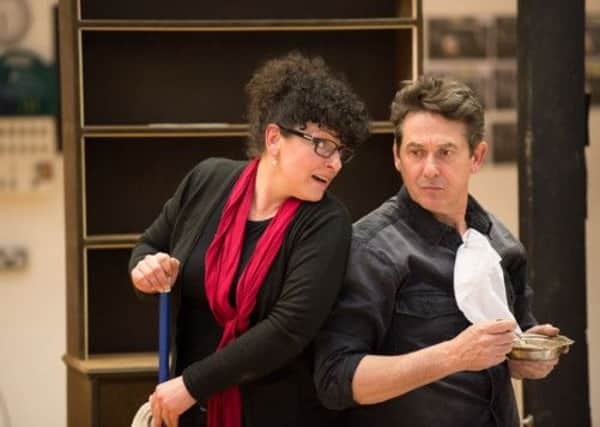It’s elementary – Sherlock will be a huge hit


Later, director Nikolai Foster will admit that he had a serious case of “tummy butterflies” and writer Mark Catley will confess that having his work read out loud in front of an audience for the first time is “incredibly emotional”.
In an upstairs rehearsal room at West Yorkshire Playhouse, where a specially invited audience is about to see the first read through of Sherlock Holmes: The Best Kept Secret, the experienced writer and director do not belie these feelings. Indeed, as the audience listens rapt as a group of actors sit around a table reading aloud the script, you’d forgive Catley and Foster for feeling a little smug.
Advertisement
Hide AdAdvertisement
Hide AdThe first read through is a massive success. Catley’s script is at turns funny, exciting, intriguing – it is safe to say that the Playhouse, with this production which opens in the Quarry theatre tomorrow, should have a major hit on its hands. It seems, however, that no matter the quality of the work you’ve created, nor the experience and success you have behind you, nerves are an unavoidable hazard of the creative process.


Foster later explains: “During the read through, I’m thinking about the set, getting my head into very practical and technical things, but it’s difficult because it’s something you feel very engaged and passionate about it, and you’re suddenly aware that everyone is sitting around watching for the first time and it’s hard to keep thinking about the practical things when you’re feeling so nervous.” Equally, Catley’s concerns are not far from the surface: “When something goes public for the first time it’s really emotional – you’re showing someone your baby for the first time and wondering if people are going to like it or not. You do feel it when people are suddenly sitting forward and when they laugh, it’s amazing.”
At this point I pause to apologise to Catley. At more than one moment during the read through I found it hard to concentrate on the performance of the actors, because I was laughing so hard at something in the script. I was not alone.
Sherlock is hot property at the moment. The Arthur Conan Doyle creation, 126 years old this year, has enthralled audiences since his first appearance in 1887 in A Study in Scarlet.
Advertisement
Hide AdAdvertisement
Hide AdSherlock Holmes, the world’s greatest detective, has been adapted for stage and screen a world record number of times. Robert Downey Jr in Guy Ritchie’s rebooted version made Sherlock sexy in recent years and Benedict Cumberbatch in the BBC series reminded us that the sleuth was a troubled genius. Catley, whose work was first discovered at West Yorkshire Playhouse over a decade ago with his debut play Sunbeam Terrace, has created a Sherlock who is witty, troubled and incredibly irreverent. The Catley trademark dark humour shines through the script.
During a brief break in the read through, Foster showed off a model of the set which will help bring Catley’s script to life. It is both impressive and large scale. Among the audience at the read through were a number of commercial producers who have a vested interest in the show – their money is set to take the play into the West End once it finishes its run in Leeds. Make no mistake, this show is going to be big.
Foster was last at the Playhouse with the hugely successful Annie. “Coming back after Annie this does feel like a lot of pressure because that did so well,” he says.
“This project we feel has to deliver for the Playhouse here in the region, but there is also the pressure of the future life of the project. Regional theatres are facing times of serious austerity, so you have to hope that this will have a positive financial impact on the theatre.”
Advertisement
Hide AdAdvertisement
Hide AdAs writer, Catley’s main concern is none of that – it’s about getting the script right. Although it was strong at the read through, he couldn’t help but be sitting there working out which bits of the show he wanted to change, rewrite, strengthen. “It’s the hardest thing I’ve ever written,” he says, unequivocally.
“It was thoroughly enjoyable and there wasn’t a moment when I wished I hadn’t taken it on, but it is definitely the hardest thing I have ever written. Why? Because you have to be as clever as Sherlock – and I am not as clever as Sherlock.”
The twists and turns in the script are quite something and Catley has thrown not just all of his writing nous at this script – he has thrown the kitchen sink at it. When he first found out that Foster was to direct a version of the story at the Playhouse, the writer – who adapted Angus, Thongs and Even More Snogging for the Playhouse stage last year – stayed up all night to work on a pitch for the story and then fought for it. “I desperately wanted to do it. There was no way I was going to let another writer get his hands on it,” says Catley. The passion shines through the script which calls for some thrilling set pieces alongside the compelling characters. Foster says: “The most important thing to say for me is what an immense achievement this is.
“There has been a constant assault of ideas and for Mark to have written a script that has such wit, warmth and rich enthusiasm is a major achievement.
Advertisement
Hide AdAdvertisement
Hide Ad“We all know what we are working on is a massive deal, so to have not been intimidated by that and to have created something so ambitious is a real achievement.”
Clearly, the audience reaction will determine how much of an achievement. For this early viewing – a group of actors around a table reading a script – to be so compelling suggests that it will be quite something.
Sherlock Holmes: The Best Kept Secret, WYP May 18-June 8. Tel 0113 213 7700. www.wyp.org.uk
Sherlock – a literary past
Sherlock Holmes first appeared in publication in 1887 and was featured in four novels and 56 short stories. The first novel, A Study in Scarlet, appeared in 1887 and the second, The Sign of the Four, in 1890.
Advertisement
Hide AdAdvertisement
Hide AdAll but four stories are narrated by Holmes’s friend and biographer, Dr Watson; two are narrated by Holmes himself. Arthur Conan Doyle said that the character of Sherlock Holmes was inspired by Dr Joseph Bell, for whom he had worked as a clerk at the Royal Infirmary of Edinburgh.
One quote often heard from Holmes is: “When you have eliminated the impossible, whatever remains, however improbable, must be the truth”.